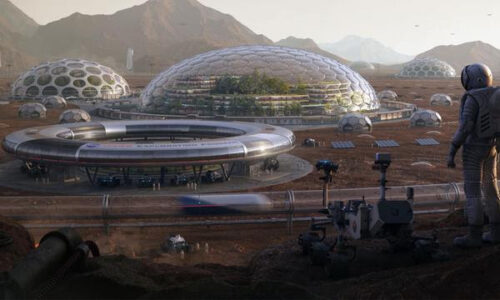This week, explore the ethics of space exploration in a session written by our colleague Marley Davies in response to a request from one of our Zoom philosophy groups over at p4he.org. Plus, we’ve added another free webinar on metacognition due to high-demand! Scroll down for more.
Warm-up: What’s this?
Click the image to see the full image.

It’s a high-resolution image of the surface of the sun (read more)! It’s not hugely philosophical, but an intriguing guessing-game and helps everyone say something early.
Introduction
“The most ambitious space exploration program is about to take place and you have been assigned, as a congress of philosophers-in-chief, to evaluate the various missions of this space program. It is your task to discuss its philosophical implications. Your job is to think of every mission from as many perspectives as possible so we can report back to the space agency and they can make a decision.”
Stage 1: To boldly go?
The public have mixed feelings about this proposed space program. Governments spend millions, and in some cases billions, on space travel. But even for the big spending countries, this is usually less than half a per cent of their overall budget. The first question to discuss is whether to explore at all…
- Is space exploration worth the cost when there are problems on Earth?
- Should space exploration be paused? If so, for how long?
- What kind of mission would it be justifiable to go on?
(If the class vote against going, say the space agency has listened to your concerns and has decided to go ahead with the mission anyway!)
Stage 2: Mission to Mars
The first aim of your government’s space agency is to make Mars hospitable to life. One proposal is to release gasses into the atmosphere to create a greenhouse effect and increase the atmospheric pressure. Another is to redirect asteroids to hit Mars and release gasses trapped in the soil. Scientists say these will one day be possible – so assume it is, so that you can park the science and get into the philosophy.

- Should we try to make Mars hospitable?
- Does Mars have a right to be left alone?
- Does Mars have value in itself? Or is its value just how it can be useful to humans?
- Can humans claim to own land outside of Earth?
- What if we found microbial life on Mars? Would this change your view?
- Would we learn from our mistakes on Earth?
- Can you complete this sentence: “We should go to Mars if and only if…”
Stage 3: Blasteroid!
There is a giant asteroid, around 200 km wide, just a little way further out from Mars. Scientists have performed research on this asteroid for some time and believe it might contain extremely valuable metals like gold and iron – worth trillions of dollars. The government thinks private companies will soon want to send rockets to extract metals from the asteroid to sell on Earth.
- Should companies be allowed to do this, if they’ve got the technology?
- Should the first company to succeed in reaching the asteroid be the only one allowed to mine the asteroid?
- Should we be able to mine cosmic objects in general?
- If enough gold was sold on earth, it would make gold less valuable. People who already own gold, and companies who mine gold on earth, would see their wealth fall. Does this make any difference?
Stage 4: Interplantery-laws
There has been some disagreement between nations about how to treat Mars and other planetary bodies. A side mission has been assigned to develop an interplanetary law that will determine how we treat other planets.
What should this law say?
Other ideas:
- Ask children if they would give the same advice to private businesses as they would to governments
- Invite them to think of other ethical questions to do with space travel – such as space tourism, or creating branches of the armed forces for space. We did have one about Elon Musk’s Starlink spoiling the night sky, but he’s since asked his team to make them less reflective. Good for stargazers, less so for philosophers!
- The Outer Space Treaty bans the siting of weapons of mass destruction in outer space. But Starlink satellites have been crucial in allowing the army in Ukraine to communicate. Is this a misuse of space?
- For a discussion resource with a news-approach, check out this lesson called “Space – a positive human future?” from the The Economist Educational Foundation.
Free metacognition webinar: extra date added!
Due to high demand, we’ve added another chance to join us for our free introductory webinar on metacognition in the classroom – on Wednesday February 22nd at 4.15 p.m. (UK time) We’ll talk about how to use the Thinking Moves A-Z framework in P4C and school generally, and share lots of activities to make metacognition not only simple, but also fun!
Best wishes,
Marley, Tom and Jason
Never miss a resource! Get these P4C ideas sent straight to your inbox every week for free.